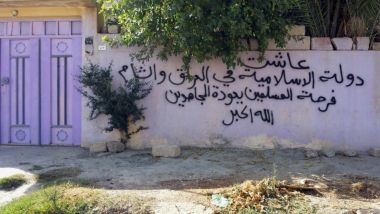Mosul empty of Christians 'for the first time in history'

Further reports of human rights abuses are surfacing as IS jihadists continue to tighten their grip on areas throughout northern Iraq and Syria.
Two Syrian women were stoned to death last week in the northern province of Raqa, charged with adultery. These were the first instances of execution via stoning, known as Al Rajem, by IS – the Islamic State, a group which formerly ran under the name ISIS.
"The Islamic State carried out its first sentence of death by stoning against a woman in Tabaqa, accusing her of adultery," a report from the Syrian Observatory for Human Rights (SOHR) revealed on Friday. The woman was a 26-year-old widow, and was executed in a public market.
Within 24 hours, another woman was killed by stoning in the city of Al Raqqa.
"IS fighters threw her by stones to death after bringing a pickup full of stones because people refused to participate of stoning," [sic] SOHR reports.
These instances follow increasing tensions as IS fighters, led by Abu Bakr al-Baghdadi, attempt to found a pan-Islamic state across a stretch of northern Iraq and Syria.
On Friday, the deadline passed for Christians in Mosul – which was captured on June 10 – to either flee the city, convert to Islam or pay a tax, jizya, for the right to continue to practice their faith.
Those who refused to comply risk being killed by "the sword".
Mosul, situated in the biblical province of Ninevah, is entrenched in Christian history. The Mosque of the Prohpet Yunas (Jonah) is thought to house the scriptural figure's grave, though a video was released earlier this month in which IS militants are shown attacking the tomb.
The insurgents allegedly disturbed Jonas' remains.
Despite the historical presence of Christians in Mosul, however, loudspeakers in mosques throughout the city reportedly rang out ordering Christians to leave on Friday. One young teacher, who gave only his first name, Fadi, told AFP that he and his family would not flee or pay the fine because they couldn't afford to do either.
"I'm staying. I already feel dead," he told a reporter just before the deadline ran out.
"Only my soul remains, and if they want to take that I don't have a problem."
Iraq's most prominent Christian leader, Yonadam Kanna, told AFP that even those who adhere to the demands of IS are unlikely to remain safe.
"Maybe a few [Christians] are still hiding in Mosul but I don't think any would have decided to pay jizya or convert. There is no Christian who can trust these gangsters," he said.
"They [Islamic insurgents] even took wedding rings from women fleeing the city at checkpoints...I am astonished they can claim to be Muslims."
"'For the first time in the history of Iraq, Mosul is now empty of Christians," Patriarch Louis Sako told AFP.
The treatment of Christians and other minority groups, including Shia Muslims, by IS has been widely condemned.
"Congratulations to the #world ISIS declared that #musel now is a #Christian free area. Thousands of Christians were displaced and humiliated," tweeted Nadim Nassar, a London-based Anglican priest from Syria.
However, despite universal horror at the events unfolding in Iraq and Syria, Nassar has also denounced the international Christian community for "shamefully watching" while taking little action against persecution in the Middle East.
#Christians paid highest price for the barbaric Islamic political fanaticism like #isis supported by governments East & West in #Syria #iraq
— Nadim Nassar (@Nadim_Nassar) July 20, 2014The latest report from SOHR indicates that IS now controls 35 per cent of Syria, and in total an area larger than Great Britain. Over 2,400 people were killed in Iraq in June amidst escalating violence, making it the deadliest month the country has experienced in years.











